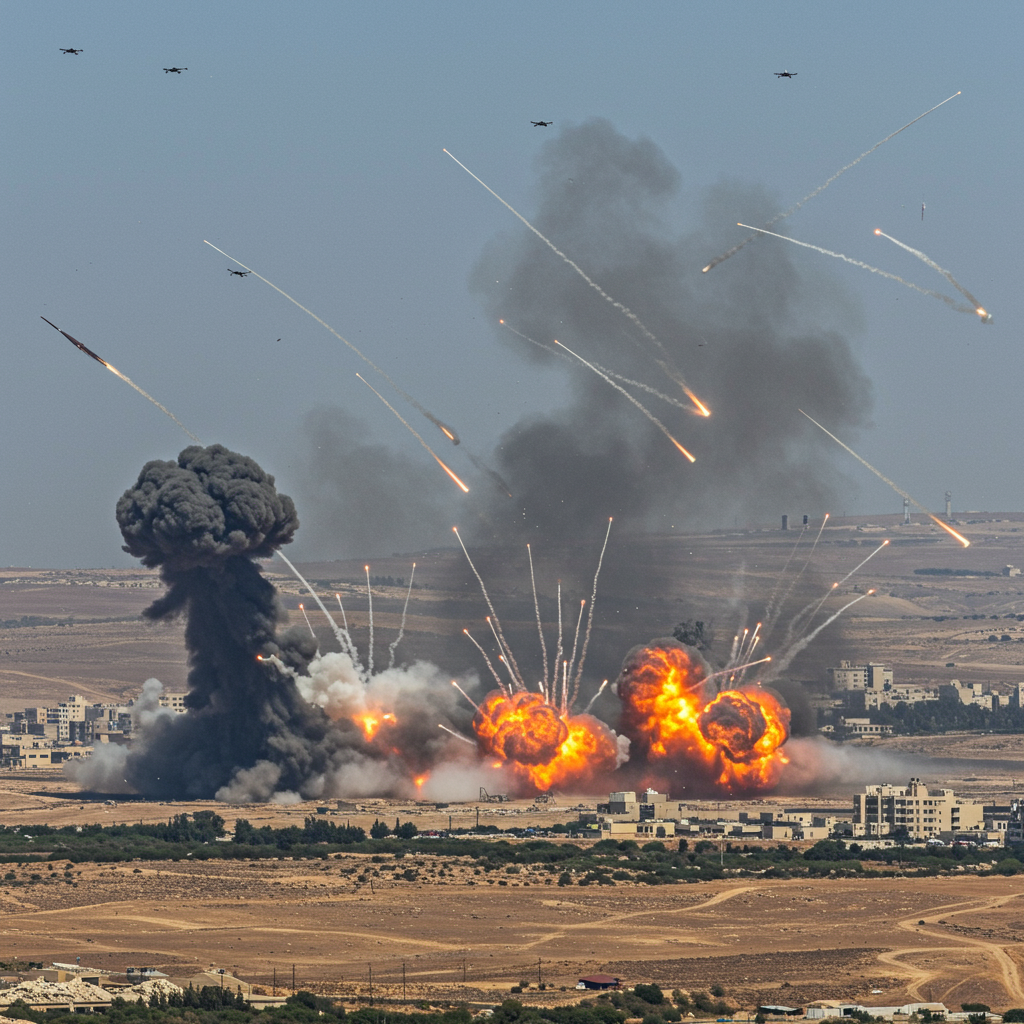Israel-Iran Exchange Heavy Strikes for Third Day as Conflict Deepens
The intense exchange of missile and drone strikes between Israel and Iran escalated into a third consecutive day on Sunday, June 15, 2025, as both nations targeted critical infrastructure, military sites, and even residential areas. The relentless attacks significantly heightened fears of a wider regional conflagration, prompting international calls for de-escalation even as planned nuclear talks between the U.S. and Iran were called off.
Neither side showed immediate signs of backing down after Israel’s initial surprise bombardment on Friday targeted key Iranian nuclear and military facilities, killing several top generals and nuclear scientists, including the head of the Revolutionary Guard’s aerospace division. Iran swiftly retaliated, launching hundreds of missiles and drones over the weekend.
Casualties Mount Amid Wide-Reaching Devastation
Sunday saw further heavy strikes, resulting in a growing death toll on both sides. In Israel, at least 10 people were killed overnight and into Sunday, bringing the total Israeli fatalities since the fighting began to 13. Hundreds have been wounded. Iranian projectiles reportedly evaded Israel’s sophisticated air defenses, striking deep within the country.
The hardest hit Israeli areas included residential neighborhoods. In Bat Yam, near Tel Aviv, a missile strike on an apartment building resulted in at least six deaths, including children aged 9 and 10. 180 people were wounded in the city, with seven still reported missing amidst the rubble. Further north, four people, including a 13-year-old, were killed and 24 wounded in a strike on the Arab town of Tamra. The central city of Rehovot also sustained damage, with 42 wounded and buildings at the Weizmann Institute of Science hit. The country’s largest oil refinery near Haifa also reported localized damage to pipelines.
Iran reported a significantly higher casualty count from the initial days of Israeli strikes, with its UN ambassador stating Saturday that 78 people had been killed and over 320 wounded. While no official update was provided Sunday, earlier reports indicated scores more casualties on Saturday, including over 60 deaths from a single missile hitting a 14-story apartment block in Tehran, which tragically killed 29 children.
Witness accounts and images from affected areas depicted widespread destruction, with streets littered with bombed-out cars, damaged buildings, and debris as first responders searched for survivors.
Targets Include Nuclear Sites, Energy Infrastructure, and Military Command
Israel’s expanded assault on Sunday included direct strikes targeting Iran’s energy industry and Defense Ministry headquarters in Tehran. The military official confirmed hitting over 80 targets overnight, including locations described as Iran’s nuclear headquarters (SPND), sites believed to house Iran’s nuclear archive, and other military bases. Strikes were reported near Vali-e Asr Square downtown and the Niroo Havaei neighborhood, home to the air force headquarters. Israel also issued a stark warning to Iranians living near “military weapons production factories” to evacuate, signaling potential future targets. Damage to Iran’s main nuclear enrichment facility at Natanz and a nuclear research facility in Isfahan were assessed by experts to require many months, possibly more, to repair, potentially impacting Iran’s nuclear capabilities.
Iran’s retaliatory strikes targeted what its foreign minister described as “economic” sites in Israel, though the visible impacts were on residential areas, infrastructure, and the Haifa refinery. Iranian media also reported Israeli strikes hitting oil facilities, including two refineries and the South Pars natural gas field, described as the world’s biggest, raising concerns about the potential for a broader assault on Iran’s vital, heavily sanctioned energy industry.
Diplomacy Falters as Tensions Soar
Amidst the escalating violence, a planned sixth round of indirect talks between the U.S. and Iran regarding Iran’s nuclear program, scheduled for Sunday in Oman, was canceled. Iran’s Foreign Minister deemed the talks “unjustifiable” following Israel’s strikes, particularly blaming the U.S. for the attacks, a claim denied by Washington.
International leaders, including the UN Secretary General and the Pope, issued urgent calls for maximum restraint and a return to diplomacy, reflecting global anxiety over the conflict’s trajectory. However, Israeli Prime Minister Benjamin Netanyahu dismissed such calls, warning that Israel’s strikes so far were “nothing compared to what they will feel under the sway of our forces in the coming days.” He vowed to continue hitting “every site, every target” of the Iranian regime. Israeli Defense Minister Israel Katz warned that “Tehran will burn” if Iran continued targeting Israeli civilians.
Iran’s Foreign Minister stated that their responses would cease if Israeli strikes stopped but maintained Iran’s right to nuclear capabilities for peaceful purposes, rejecting any deal that would strip them of these “nuclear rights.” Signalling expectations of continued attacks, Iranian authorities announced that metro stations and mosques would be made available as public bomb shelters.
U.S. President Donald Trump publicly supported Israel’s actions but reiterated that the U.S. was not directly involved. He issued a strong warning to Tehran against retaliating against the United States, threatening unprecedented military force. Despite the heightened tension, Trump also suggested that Iran and Israel “should and will make a deal” to end the conflict. Meanwhile, an Iran-linked Iraqi militia, Kataib Hezbollah, issued an explicit threat to target U.S. interests in the region if Washington intervened.
The conflict has caused significant disruption, including the closure of Israel’s main international airport and its airspace for a third consecutive day. Economically, the escalating tensions also impacted the wider region, with Egypt’s currency and stock market plunging on Sunday. As the conflict enters a new week, the region braces for the potential of prolonged hostilities, fueled by the long-standing animosity between Israel and Iran and the critical issue of Iran’s nuclear program.


